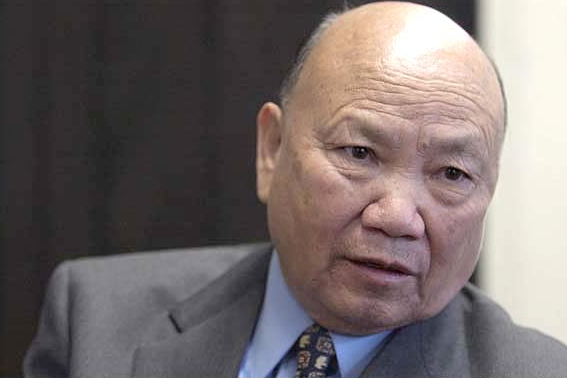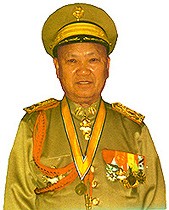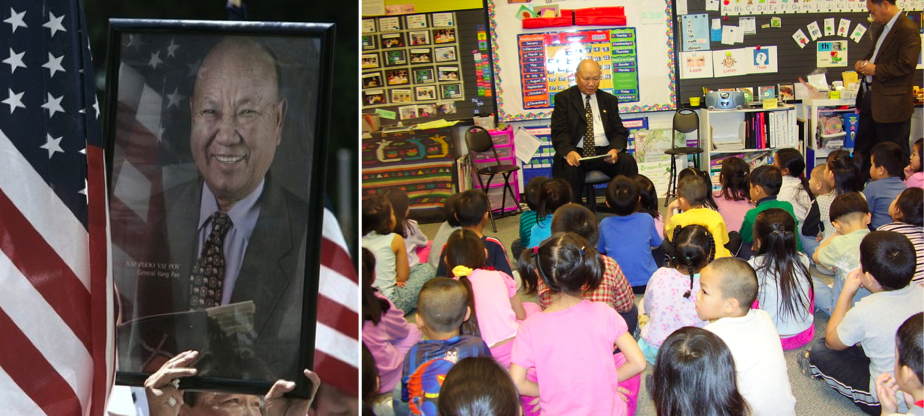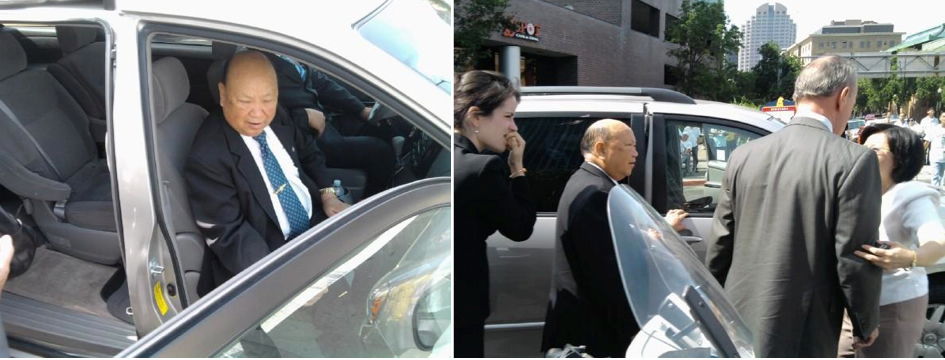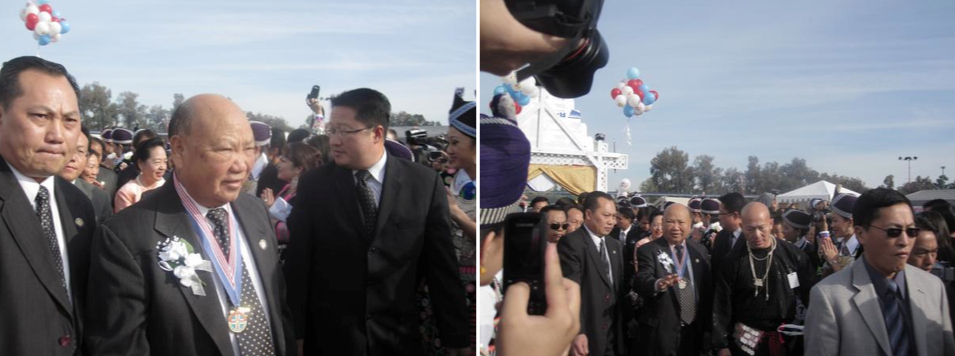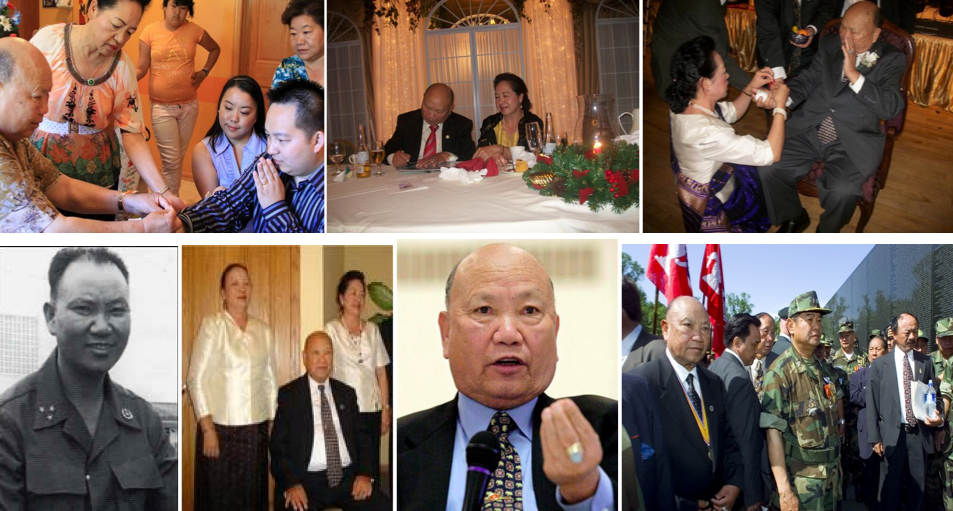General Vang Pao (Vaj Pov)
Vang Pao (Hmong: Vaj Pov, born 1929) is a former Major General in the Royal Lao Army. He is an ethnic Hmong and a leader of the Hmong American community in the United States.
Early life
Vang Pao was born on December 8, 1929, in Central Xiangkhuang Province, in the northeastern region of Laos. He began his early life as a farmer until Japanese forces invaded and occupied French Indochina in World War II. In his early teen years, Vang Pao launched his military career, joining the French Military to protect fellow Hmong during the Japanese invasion.
Military career
The term “Meo Maquis” was originally used by Free French and Allied intelligence officers to describe the Hmong resistance forces working against the Japanese forces occupying Indochina and China during World War II. After WWII, French GCMA authorities recruited Vang Pao as an officer during the First Indochina War to combat the Viet Minh. Although French forces lost the war, Vang remained in the army of the newly independent Kingdom of Laos. He was the only ethnic Hmong to attain the rank of General officer in the Royal Lao Army, and he was loyal to the King of Laos while remaining a champion of the Hmong people. During the 1960s and 1970s General Vang commanded the Secret Army, a highly-effective CIA-trained and supported force that fought against the Pathet Lao and People’s Army of Vietnam.
[sz-youtube value=”08CEFAE303669E9C” type=”playlist” max=”50″ sortorder=”viewCount” lightbox=”1″ autoplay=”1″ hd=”1″ width=”640″]
Vang Pao in the United States
Major General Vang immigrated to the United States after the communists seized power in Laos in 1975. He remains widely respected by his fellow Hmong and is an esteemed elder of the American Hmong people, many of whom experienced the war or the reprisals that followed. Though he is somewhat less influential among younger Hmong-Americans who have grown up primarily in the United States, he has generally been considered an influential leader of U.S.-based Hmong, enjoying great loyalty for his position of leadership and respect for his military accomplishments.
While in exile, Vang Pao assembled other Lao and Hmong leaders from around the world to create the United Lao National Liberation Front (ULNF), also known as ‘Lao National Liberation Movement ‘ and Neo Hom,[4] a right-wing pro-royalist political movement.
The government of Laos, along with the governments of Vietnam, the People’s Republic of China, Cuba and North Korea are the world’s few remaining bastions of communism. In the mid-1990s, Vang Pao, aided by influential American diplomatic allies and vast numbers of Hmong-Americans, halted forced United Nations-sponsored repatriation back to Laos of thousands of Hmong refugees in Thailand. It was a major human rights victory for the Hmong. The Thailand-based refugees, many of whom had been living in refugee camps at Wat Tham Krabok, a Buddhist temple in Thailand, were afforded the right to avoid the forced return to Laos and instead were offered relocation rights and assistance to the U.S.
Throughout Vang Pao’s residence in the U.S., the Hmong leader has diplomatically opposed human rights violations by the communist government of Laos against the Hmong. In 2001, Vang Pao began to moderate this position, publicly advocating normalization of U.S.-Laotian relations in hope of alleviating the human rights abuses by the Laotian government against the indigenous Hmong people.
Alleged plot to overthrow government of Laos
On June 4, 2007, following a lengthy federal investigation labeled “Operation Tarnished Eagle,” warrants were issued by U.S. federal courts ordering the arrest of Vang Pao and nine others for allegedly plotting to overthrow the communist government of Laos, an enemy the United States government trained Vang Pao to fight some thirty years ago, in violation of the federal Neutrality Acts. Following the issuance of the warrants, an estimated 250 federal agents representing numerous U.S. federal law enforcement and other agencies conducted simultaneous raids on homes, offices and other locations throughout central and southern California, arresting Vang Pao and the other nine. The federal charges allege that members of the group inspected weapons, including AK-47s, smoke grenades, and Stinger missiles, with the intent of purchasing them and smuggling them into Thailand, where they allegedly would be shipped to anti-Laotian governmental resistance movement forces inside Laos. The one non-Hmong person among the nine arrested, Harrison Jack, a 1968 West Point graduate and retired Army infantry officer, allegedly attempted to recruit Special Operations veterans to act as mercenaries in an invasion of Laos.
On June 15, the defendants were indicted by a grand jury and an 11th man was arrested in connection with the alleged plot. The defendants face possible life prison terms for violation of the U.S. Neutrality Act and various weapons charges. Vang Pao and the other Hmong were also initially denied bail by the California federal court, which cited each of them as a flight risk.
Since the June 4 federal raid, Vang Pao’s arrest has been the subject of mounting criticism. Vang Pao’s fellow friends, including Hmong, Mienh, Lao, Vietnamese, and Americans individuals who knew Vang Pao protested the arrest and rallied throughout California, Minnesota, Michigan, North Carolina and Wisconsin. Several of Vang Pao’s high-level U.S. supporters have criticized the California court that issued the arrest warrants, arguing that Vang Pao is a historically important American ally and valued current leader of U.S. and foreign-based Hmong. Numerous calls for Republican Governor Arnold Schwarzenegger to dismiss the case have yet to be answered and are presumably under consideration by the state.
Prior to his arrest, Vang Pao was slated to have an elementary school in Madison, Wisconsin named after him, a proposal that met with opposition over Alfred W. McCoy’s allegations that Vang had been involved in war crimes and drug trafficking, with Gary Yia Lee and other scholars strongly disputing his claims. Vang’s June 2007 arrest later led the Madison School to reopen discussion on the school’s naming. On June 18, 2007, the Madison Metropolitan School District Board of Education voted to drop Vang’s name from the new school, in light of the federal charges against him and the previous allegations.
Read FULL Criminal Complaints Against General Vang Pao HERE!
Release from jail
On July 12, 2007, under significant pressure from Vang Pao’s Hmong and influential American supporters, the California federal court ordered the release of the Hmong leader on a US$1.5 million bond secured by property owned by members of his family. The Hmong were joyful to hear this news; many had participated in numerous protests over several weeks in California and elsewhere, calling for Vang Pao’s release from the date of his incarceration until his release under bail nearly a month later.
Return to Court
On March 9, 2009, Vang Pao’s lawyers filed a motion seeking to dismiss the charges against him. His lawyers claimed that the charges were fabricated and had no bearing in court. Following this appearance, on April 6, 2009, federal prosecutors denied all allegations of fabrications in the motion. That following month, on May 11, 2009, Vang Pao returned to federal court in Sacramento, California with his lawyers to argue the motion. Judge Frank Damrell stated, after hearing the arguments for the motion, that there was not sufficient evidence from the defense to justify a dismissal.
Charges dropped
On September 18, 2009, the federal government dropped all charges against Vang Pao, announcing in a release that the federal government was permitted to consider “the probable sentence or other consequences if the person is convicted.â€
Death
General Vang Pao, who battled diabetes and heart problems, died aged 81 of pneumonia with heart complications on January 6, 2011, at Clovis Community Medical Center. His eldest son Chao Francois Vang said he had been admitted to the hospital on December 26, 2010, after attending Hmong New Year celebrations in Fresno. A hospital spokesman said his family had been at the hospital at the time of his death.
Traditional Hmong funeral services for Vang Pao were scheduled to be held for six days, starting February 4, 2011, at the Fresno Convention Center. More than 10,000 Hmong mourned the leader on the first day of the funeral.
A committee unanimously voted against a request to bury Vang Pao at Arlington National Cemetery
Vang Pao had 25 children with two wives.
Photos of General Vang Pao
Audio History of General Vang Pao in Hmong
Videos of General Vang Pao
Sources:
http://en.wikipedia.org/wiki/Vang_Pao
Yue Pheng Xiong -Â http://mojthem.com/
Youtube
